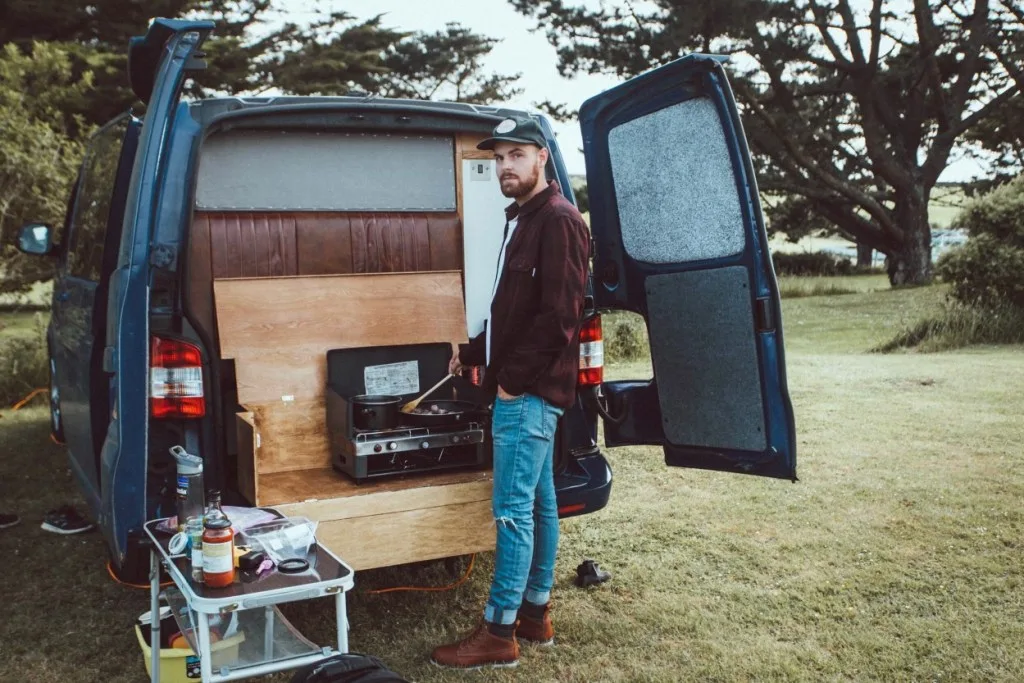Van life culture is all the rage these days. Social media has played a big part in bringing it to the mainstream.
Instagram posts make it look pretty idyllic, but is there more to it than what you see in the photos? Is it all sunsets, rainbows, and sipping coffee lakeside?
We decided to learn more about van life culture and why many people choose it over more traditional lifestyles.
Let’s jump in!
What is Van Life Culture?
The concept of living or traveling in a van for extended periods is not exactly new. Some may think it started in the 1950s when Volkswagen introduced the Microbus. But you might be surprised to learn the tradition goes much further back in history.
The term “van dwellers” was first used in the late 1880s in the United Kingdom. It referred to a group of show performers who traveled in caravans (or vans, if you will) throughout the UK.
About 25 years later, bus manufacturer Roland Conklin introduced his Conklin Family Gypsy Van. Resembling modern-day RVs, this van was 13-feet high, 25-feet long, and weighed eight tons. Its most impressive features included an observation deck, dance floor, and a retractable “bridge” for closing gaps along the road.
But the van life culture most often thought of today seems to have its roots in the late 1960s. West Coast Microbus and passenger van owners would get together for weekend “van runs” to nearby beaches or deserts. It wasn’t long before the trend spread across the country.
Today, van life culture is enjoyed by owners of all different kinds of rigs. VW buses are still popular. However, with the popularity of van conversions, more people opt for non-traditional vehicles. It’s not surprising to see van lifers in everything from utility-style vans to shuttle buses to former ambulances.
Van life culture encompasses everything from people simply taking weekend trips away to living full-time in their vans. There’s no one-size-fits-all way to be part of the culture. And that’s what seems to draw so many people to this life.
Pro Tip: If you think #VanLife is right for you, check out these Best Camper Vans in 2022.

Why Do People Choose Van Life?
Many turn to van life to live a more minimalistic way of life. They also feel living this way gives them more freedom to do more than just eat, sleep, work, and repeat every day.
The idea of exploring in your vehicle and still having everything you need is very appealing. Inside the van, you have your bed, small fridge or cooler, clothes, and other necessities. Many have some sort of toilet and set up areas outside the van for showers and a kitchen.
And just because people are living and traveling in their vans doesn’t mean they aren’t working. Many turn office jobs into remote work or they’ve found new ways to make money from the road.
The ability to travel in a self-contained vehicle and not pay for hotels or plane tickets is another reason people choose this lifestyle. You can travel at your own pace and change up the scenery whenever you want.
For nature-lovers, van life culture gives them the chance to feel more connected to their surroundings. With vans, you can find sweet spots to camp along rivers, in the mountains, or the wide-open desert.
Vanlifers often choose Bureau of Land Management (BLM) or National Forest land, which is available for free camping. Of course, these lands have some restrictions, such as maximum length of stay or designated areas.
Another reason van life is appealing to some is reducing their carbon footprint. Living in a house or apartment, running electricity 24 hours a day, and driving to a job contributes to pollution.
Most van lifers tend to find a place to park anywhere from a few days to two weeks at a time. They can significantly reduce their overall contribution to greenhouse gasses living this way.

What Are the Downsides to Living in a Van?
While it seems there are many upsides to being part of the van life culture, there are also downsides.
For one thing, it isn’t cheap! Some people believe they’ll save money living this way. But you still have to pay for gas, food, and other necessities like a phone, internet, and unexpected emergencies. And, inevitably, your vehicle will need repairs and maintenance of some sort.
If you feel the need to shower every day, van life might be challenging. Living in a van means you often don’t have access to an unlimited water supply. Most times, you’ll be using portable jugs of water.
You’ll need to conserve your supply until you find a place to refill. Many van lifers get accustomed to sponge baths between finding actual showers to use.
Another negative aspect of van life is constantly finding places to camp. This can be especially tricky for people with remote jobs who need a good internet signal. For those who prefer to camp on BLM land, it’s not always possible to get a beautiful natural setting and good WiFi.
If you consider yourself a social person, living the van life will likely reduce your social interactions to some extent. Even couples traveling together often find the isolation from others to be challenging. After weeks or months on the road, some may feel a sense of loneliness and a desire for community.
Fortunately, most of these downsides to van life culture have relatively easy solutions. But you’ll need to ask yourself if you’re ready to face these obstacles to live your dream. Living in a van down by the river can be done right, with the proper preparations!
Pro Tip: #VanLife isn’t always perfect. In fact, these are 5 Reasons to Avoid Van Life!

Van Life Culture as Portrayed on Social Media
If you search for #vanlife on Instagram, you’ll find photos making this lifestyle look like it’s all rainbows and butterflies. It can be glamorous and beautiful – sometimes.
Those social media posts showing hikes in the forests, swimming in alpine lakes, and sitting around campfires are real. In fact, most days, van life can be pretty awesome.
But what about those days (or weeks) when it’s not? A woman named Anna posted a YouTube video where she discussed the reality of what van life was like for her. While everyone will have their own opinion of the van life experience, Anna’s video highlights elements that aren’t uncommon.
One commenter on Anna’s video, Victoria Rose, had this to say, “I lived in a van for 2.5 months. I only got to shower every other day, some nights were super uncomfortable and hot. The van would get messy and dirty due to us camping often and tracking dirt and other debris inside.”
While another poster, Gonzalo Sanchez, pointed out, “Just for the record, nothing in life is like Instagram and social media.”
Is Van Life Worth It?
The answer to whether van life is worth it or not is a very personal one. Almost every van lifer you ask will have a different answer to that question.
The best advice we’ve heard from those in the van life culture is to try it out first before jumping into it full-time. There are websites like Outdoorsy.com where you can rent a camper van to try it out for a weekend or longer.
If van life is something you’ve been dreaming about, the potential obstacles can be worth it to fulfill that dream. Or it could become a nightmare if you’re not quite ready to face the challenges head-on.
So, What is the Problem With Van Life Culture?
There’s really not a problem with van life culture that we can see, so long as you’re looking at it realistically. If you jump into the lifestyle with certain expectations, you may be disappointed when reality hits.
The problem is social media and the perception it creates about van life.
If this is something you’ve been considering, be sure to do as much research as possible before jumping in. And if you’ve been living the van life for any length of time, we’d love to hear your thoughts!
Discover the Best Free Camping Across the USA
To be honest with you, we hate paying for camping. There are so many free campsites in America (with complete privacy).
You should give it a try!
As a matter of fact, these free campsites are yours. Every time you pay federal taxes, you’re contributing to these lands.
Become a FREE CAMPING INSIDER and join the 100,000 campers who love to score the best site!
We’ll send you the 50 Best Free Campsites in the USA (one per state). Access the list by submitting your email below:
you still have these even living in a house along with more bills to pay out, van life is still cheaper
For one thing, it isn’t cheap! Some people believe they’ll save money living this way. But you still have to pay for gas, food, and other necessities like a phone, internet, and unexpected emergencies. And, inevitably, your vehicle will need repairs and maintenance of some sort.
I’m hoping the problem is going to go away with many people dropping out and moving on to the next fad. Fewer people, better for me. It’s not a fad for me. Been doing this in one form or another since 1969. I could give out many secrets that makes the life easier, but I want you all to give up and go 😆🤣